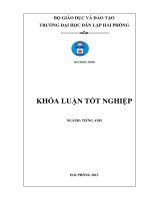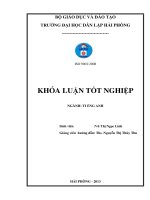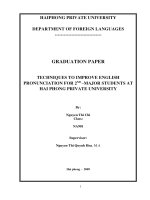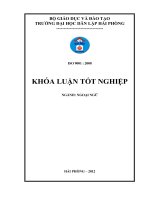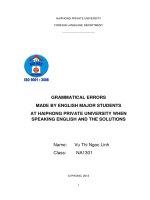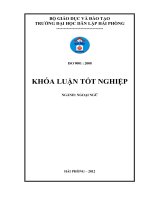A study on how to improve speaking skill through extra activities for the first-year English non - major students at Hai Phong Private University
Bạn đang xem bản rút gọn của tài liệu. Xem và tải ngay bản đầy đủ của tài liệu tại đây (764.25 KB, 56 trang )
Haiphong private univerysity
Department of foreign languages
Graduation paper
A study on how to improve English
speaking skill through extra- activities
for the first year english non- major
students in hai phong private university.
By:
Nguyen Thi Dieu Huyen
Class:
NA904
Supervisor:
Le Thi Hong
Hai phong- June 2009
1
Bộ giáo dục và đào tạo
Tr-ờng đại học dân lập Hải Phòng
---------------------------------
Nhiệm vụ đề tài tốt nghiệp
Sinh viờn: ............................................................Mó s:............................
Lp: .............................Ngành:....................................................................
Tên đề tài: .................................................................................................
..................................................................................................
.................................................................................................
2
Nhiệm vụ đề tài
1. Nội dung và các yêu cầu cần giải quyết trong nhiệm vụ đề tài tốt nghiệp
( về lý luận, thực tiễn, các số liệu cần tính toán và các bản vẽ).
……………………………………………………………………………..
……………………………………………………………………………..
……………………………………………………………………………..
……………………………………………………………………………..
……………………………………………………………………………..
……………………………………………………………………………..
……………………………………………………………………………..
……………………………………………………………………………..
2. Các số liệu cần thiết để thiết kế, tính tốn.
……………………………………………………………………………..
……………………………………………………………………………..
……………………………………………………………………………..
……………………………………………………………………………..
……………………………………………………………………………..
……………………………………………………………………………..
……………………………………………………………………………..
……………………………………………………………………………..
3. Địa điểm thực tập tốt nghiệp.
……………………………………………………………………………..
……………………………………………………………………………..
……………………………………………………………………………..
3
CÁN BỘ HƯỚNG DẪN ĐỀ TÀI TỐT NGHIỆP
Người hướng dẫn thứ nhất
Họ và tên:
Học hàm, họcvị:
Cơ quan công tác:
Nội dung hương dẫn:
Người hướng dẫn thứ 2:
Họ và tên:
Học hàm, học vị:
Cơ quan công tác:
Nội Dung hướng dẫn:
Đề tài tốt nghiệp được giao ngày:......tháng.........năm 2009
Yêu cầu hoàn thành trước ngày .........tháng..........năm 2009
Đã nhận nhiệm vụ Đ.T.T.N
Sinh viên
Đã giao nhiệm vụ Đ.T.T.N
Cán bộ hướng dẫnĐ.T.T.N
Hải Phòng, ngày........tháng .........năm 2009
HiỆu trƯỞng
4
PHẦN NHẬN XÉT TÓM TẮT CỦA CÁN BỘ HƯỚNG DẪN
1. Tinh thần, thái độ của sinh viên trong quá trình làm đề tài tốt nghiệp.
2. Đánh giá chất lượng của Đ.T.T.N ( So vơi nội dung, yêu cầu đã đề ra
trong nhiệm vụ Đ.T.T.N trên các mặt lý luận, thực tiễn, giá trị tính tốn,
chất lượng các bản vẽ)
3. Cho điểm của cán bộ hướng dẫn
(Điểm ghi bằng số và chữ)
Hải Phịng, ngày.........tháng........năm 2009
Cán bộ hướng dẫn chính
(Họ tên và chữ ký)
5
NHẬN XÉT VÀ ĐÁNH GIÁ CỦA
CÁN BỘ CHẤM PHẢM BIỆN ĐỀ TÀI TỐT NGHIỆP
1. Đánh giá chất lượng đề tài tốt nghiệp về các mặt thu nhập và phân tích số
liệu ban đàu, cơ sở lựa chọn phương án tối ưu, cách tính tốn chất lượng
thuyết minh và bản vẽ, giá trị lý luận và thực tiễn đề tài.
2. Cho điểm của cán bộ phản biện
(Điểm ghi bằng số và chĩư)
Hải Phòng, ngày.........tháng.........năm2009
Người chấm phản biện.
6
Acknowledgement
In the process of completing this research paper, I have receided a great deal of
help, guidance and encouragement form many teachers, friends and my family.
First of all, I would like to express my deepest thanks to Ms Le Thi Hong, my
supervisors for their constant and tireless support throughout this study.
Next, I am indebted
to MsTran Ngoc Lien, Dean of Foreing Language
Department with her useful advices and ideas. My sincere thanks also go to
other teachers in Foreign Language Department for their lectures and
instructions during the four years which helps me much in completing this
study.
Espeacially, I am profoundly grateful to all the members in my family and
friends, who always beaside me, suporting me to complete this paper.
Finally, I wish to thank all those who have kindly given their advice and helped
me with source materials during the writing of this paper.
Hai Phong, June 2008
Nguyen Thi Dieu Huyen- NA 904.
7
Table of contents
Acknowledgement .............................................................................................. 4
Part I: INTRODUCTION ................................................................................ 4
1. Rational .......................................................................................................... 4
2. Aims of the study and the scope of the study.............................................. 5
2.1. Aims of the study. ................................................................................ 5
2.2. Scope of the study. ................................................................................ 5
3. Method of the study ...................................................................................... 5
4. Design of the study ....................................................................................... 6
Part II: DEVELOPMENT ............................................................................... 7
Chapter1: Literature Review. .......................................................................... 7
1. what is speaking? ........................................................................................... 7
2. The purpose of speaking .............................................................................. 8
3. Major types of speaking extra- activities .................................................... 8
3.1. Using the language game ...................................................................... 8
3.1.1. The definition of language game ............................................... 8
3.1.2. The purpose of language game .................................................. 9
3.2. The storytelling ..................................................................................... 10
3.2.1.The definition of Storytelling ...................................................... 10
3.2.2. The purpose of Storytelling........................................................ 10
4. The importance of using extra- activities. .................................................. 11
4.1. Extra- activities improve the personal development .............................. 11
4.2. Extra- activities influence the social behaviour. .................................... 11
Chapter II: A study on learning and teaching speaking skill for the
first year English non- major students at Hai Phong Private University. .. 12
2. The reality of learning and teaching English speaking skill at Hai
Phong Private University. ............................................................................... 12
2.1. The teaching staff. ................................................................................... 12
2.2. The students ............................................................................................ 12
2.3. English teaching and learning condition at Hai Phong Private University. ........................13
3. The survey questionaire. .............................................................................. 13
3.1. The design of the survey questionaire. .................................................... 14
8
3.2. The data analysis. ..................................................................................... 15
The survey questionaire ......................................................................... 16
3.2.1. Students interest in learning English. ........................................... 18
3.2.2. The way of learning and teaching a English speaking lesson....... 22
3.2.3. Some expected techniques to learn and improve speaking skill. . 24
4. Findings and discussions of findings. .......................................................... 25
Chapter III: Some suggested techniques to study English speaking skill
for the first year English non- major students ............................................... 27
3. Suggested activities for teaching and studying English speaking skill. ... 27
3.1. The language game ............................................................................... 27
3.1.1. The advantages of using Language games. ..................................... 28
3.1.2. Introduce six suggested extra- activities of using language games. ...............28
A. The “ Twenty second” game. ................................................ 29
B. “ Where are my glasses?” game. ........................................... 30
C. The Word search game. ........................................................ 30
D. The Matching game. .............................................................. 32
E. The Hangman game. .............................................................. 33
F. The Crossword game. ............................................................ 34
3.2. Story telling activities. .......................................................................... 35
3.2.1.The advantages of storytelling. ..................................................... 36
3.2.2. The procedure of story telling. .................................................... 36
A. Before Story telling. ............................................................... 36
B. While Story telling. ................................................................ 37
C. After Story telling. ................................................................. 38
4. Suggested activities to improve speaking skill for the 1st year English
non- major students at Hai Phong Private University. ................................ 41
4.1. Teaching through poems, songs…. ........................................................... 41
4.2. Using pictures in teaching and studying English speaking. ...................... 42
4.3. Studying through the funny games. .......................................................... 44
4.4. Aplicibility of Internet in studying English speaking skill. ..................... 45
4.5. Using mass media. ................................................................................... 49
4.5.1 Using books and magazines ......................................................... 49
Part III: The Conclusion ................................................................................. 51
9
part I: Introduction
1. Rationale
Nowadays, it can’t denied that English is becoming the common tounge of our
global village. Whether you live and work in an English speaking country or
need English for travel and fun, English is the passport to success and a deeper
understanding of our quickly chainging word. Therefore, teaching and learning
English is very important and necessary because mastering English is the best
and the shortest way for us to have a great deal of opportunities to reach the
success of life. The English learner, from elementary pupils to students, from
worker to government employers study English with the interest and enthusiam.
But Vietnamese students, espeacially the 1st year English non- major students
have a lot of difiiculties in learning and practising English speaking skill. They
often fall into confusion when speaking English because lack of professional
knowledge, confidence, and the good learning method as well. Beaside, the
learning passived environment with the same and boring lessons without the
interesting extra- activities prevent them from practising and improving English.
That is the main reason why they don’t get the effective result in learning
English, especialy the Englis speaking skill.
Due to the above, I make a sketry presentation on some effective method of
studying English with the hope that this can help the first year English nonmajor students at Hai Phong Private University will study English better in the
near future. And one of my suggested method is to study English speaking
through extra- activities. That is the reason why I decided to choose the research
with the title “ How to improve English speaking skill through extra- activities
for the first year English non- major students at Hai Phong Private University”
10
2. Aims of the study and the scope of the study
2.1. Aims of the study
My study is about to help the first year English non-major students at Hai Phong
Private University improve their speaking skill through extra- activities and to
prepare for them to the basic knowledge of speaking skill with higher
requirement for the next graders. To sumarize the above, my study is aimed at:
- Cover background knowledge of speaking
- Find out reality of teaching and learning English at HaiPhongPrivate
University.
- Find out appropriate techiniques for teaching speaking lessons which draw
students’s attention into the lesson. The students will feel interested, enjoyable
and funny when they come into the speaking lesson. Some good techniques,
especially the extra- activities will be given out inorder to improve their
speaking skill.
It should be noted that this paper shouldn’t be considered exclusive to English
non- major students at Hai Phong Private university. Infact, the fundamental
concepts and result of this paper can be applied to most English learners.
2.2 The scope of the study
There are so many different material resources and researchers that require a lot
of time and effect while my personal experien ce is limited. Therefore, this
study can only foucs on study some effective techniques in studying English
speaking skill, especially through the extra- activities for the first year English
non- major students at Hai Phong Private University.
I hope that this study is a good reference material for the English non major as
well as all students who wish to get the higher speaking skill.
3. Methods of study
To finish this study, I myself carry out some following methods.
- Researching on reference books and websites.
- Attending English speaking periods at English non- major classes at Hai Phong
Private University.
11
- Interviewing and conducting the survey questionaires for the first year English
non- major students at Hai Phong Private University with a point to find out
their recognizations, attitudes of the matter and the difficulities they encounter
when practising English speaking skill.
- Basing on my personal experience from my under graduating time in the
university through speaking skil at class.
4. Design of the study
A table of contents with pages numbers in which they are presented with help
readers have a clear overview of the research proposal. It also helps readers find
the part they need more easily and quickly. The study contains of three parts:
Part I: The introduction are literature review, aims, scope, methodsand the
design of the study.
Part II: The development are three chapters:
- The first chapter is Literature Review which provides readers the overview of
speaking skill through the extra- activities.
- The second chapter is the Survey Questionaire for the first year English nonmajor students. This chapter refers to the analysis and the findings obatained
from the survey questionaires and evaluations from students, interviewing
teachers to find out the necessary informations and the discussion of the findings
from the survey.
- The third chapter focuses on suggested applicable techniques to teach and
practisning English speaking skill fo rthe first year English non- major students.
Part III is the conlusion which sumarized all the presented informations.
12
Part II. Development
Chapter I: Literature review
Firstly, to master the techniques of studying speaking skill, especially for the
first year English non- major students of Hai Phong Privste University, it is
imposible not to mention the concept of speaking.
1. What is speaking
Different people use the term “ speaking” in different ways, which can cause
much confusion. Speaking a foreign language ususally seems much harder than
learning to write and and read it, especially to the first year English non- major
students. Often the most important problems peple have with forein language is
that they can not speak their thinkings and their ideas as well. In fact, it is likea
vicious circle: they make mistakes, they become afraid of speaking and thus
they never get the practise which would able to correct their mistakes. Most of
the beginning learners do not understand axactly “ what is speaking?”. We only
regard speaking sd a simple, easy process that involves speaking the words, the
ideas…by speaking out what they think without the correct. So, we had better
start by making sure that we are thinking about the same thing when we use this
term. As the first step, it would be use ful to undersytand “what is speaking”.
According to the Oxford Pocket dictionary of Current English 2009 “ Speaking
is the action of conveying information or expressing one\s thoughts and feelings
in spoken language. And speaking used to indicate the degree of accuracy
intended in a statement or the point of view from which it is made.”
In the book “ Developing speaking skill” of David Scheter, published on 1999,
there is a definition that: “ Speaking is to uuter words or articulate sounds, as
human beings to express thoghts by words, as the organs may be so obstructed
that a man may not be able to speak”. Meanwhile in the book “ Collins Cobuild
English for avanced learner 4th edition, published in 2007 definites that “
13
Speaking is the activitiey of giving speechs and talks, to indicate the opinion you
are giving”.
“ Speaking is also understood is the productive skill in the oral mode. It, like the
oral skills, is more complicated than it seems at first and involves more than just
pronouncing words” ( In the website Lingua Link Library, Version 3.5,
published on CD.ROMby SIL International 1998).
2. The purpose of speaking though extra activities.
Speaking is usually the topic priority probably the most important aspect of the
language for communication and students enjoy it. Futhermore, speaking
activities improve the atmosphere in the classroom, group dynamic and help
build a rapport among students and between students and teachers. Speaking
activities are also a good indication of student’s strength and weakness.
When we speak Enghlish as a foreign language, it is not simple to repeat what
the teacher say. Students have to use activities in speaking as a tool to perform
oral tasks with real motivation behind them. When given a purpose, spoken
activities are much more rewarding and engaging not to mention motivating.
3. Major types of extra- activities.
There are many useful extra- activities for students to improve speaking skill.
Each types of extra- activities has its own characteristic and the using. When
you know exactly about the type, the characteristic of extra- activities, you will
use it effectively. I have read many different sources from books as well as
vaious websites, and basing on the purpose of speaking through extra- activities
that suits for the first year non- major English students, I would like to introduce
some typical/ common types of extra- activities which are very useful and easy
to practise. They are the language games and telling story.
3.1Using language game.
3.1.1. The definition of “ language games”.
One of the language skills that must be mastered by any foreign language
learner is the ability to speak or communicate in the target language fluently.
However, most of the researchs finding has shown that most of the students
14
learning English, especially the English non-major students are quite difficult to
improve their English speaking ability since they are customed to use their
native language in their daily life. So that, language games is belived can give
the positve effect and joyful learning to the sudents in developing their speaking
skill. So,what is the language game?
The term of “ language games” refers to the models of primitive languages that
invent to clarify the working of language in general. It refers to games that
childrens which enable them to learn language.( according to Wittgenstein as
citied in Shawver). So, it can be said that, language games not only function as
time filling activities but also can bring some educational values that enable the
children to learn English.
While Mc Cabe ( 1992) defines a language games as spoken routine for two or
more players, meant to repeated many times. This implies that such repetition
will enable the chidren to communicate effectively since playing language
games will help the children to develop language and thought.
From the definition above, it can be seen clearly that language games do not
only povide supportive activities and practises that can motivatethe students to
interact and communicate, but games can also create opportunities for students
to acquire the language is a meaningful way.
Inshort, it can be said that, language games are able to help students use and
practise the target language in a relaxed way.
3.1.2. The purpose of language games
-The purpose of language game is that it can be a very useful teaching technique
for the effective and joyful learning. Games also believed can give the positive
effect on the student’s interest and motivation in studying English as well as to
increase their speaking ability.
- According to Steinberg ( as cited in Arifin 2003) empasized that games are
viable method to achieve many eduactional objectives such as reinforcement,
review reward, relax, inhibition, reduction, attentiveness, retention and
motivation.
15
3.2The Story Telling
3.2.1The definition of “Story Telling”
Story telling is an oral sharing of a personal or traditional story, told using the
essence of the tradition from which it originates. As a shared experience
between teller and listener, ot offers natural language experiences for students.
According to the website: en.wikipedia.org/wiki/story-telling
there is a
definition that; Storytelling is an ancient art of conveying events in words,
images, and sounds often by improvisation or embellishment…
While in the website emotion-research.net/wiki/Glosary definites: Storytelling is
a style of narrative in which a particular agent- the story-teller-presents
anarrative to one or more agents, usually through verbal
According to a definition dicussed by member of the National Storytelling
Association: Story telling is the art of using language, vocalization and/ or
physical movement and gesture to reveal the elements and images of a story to a
specific, live audience. A central, unique aspect of story telling is its reliance on
the audience to develop specific visual imagery and detail to complete and cocreate the story.
Inconclusion, story telling also is an interactive performance art form, is a
process, a medium for sharing, interpreting, offering the content and meaning of
a story to an audience.
3.2.2 The purpose of using storytelling
Storytelling can be an enjoyable activity for both tellers and listeners and should
be engaged in at all grade levels. The teacher should model storytelling before
expecting students to tell stories. As well, students should have opportunities to
listen to Native Elders and other storytellers who can provide enjoyment and act
as role models for their own storytelling experiences.
Storytelling can be a nurturing way to remind children that their spoken words
are powerful, that listening is important, and that clear communication between
people is an art.
16
4.The importance of using extra- activities.
Success in speaking skill through extra- activities can open a whole world of
opportunities for all of us. It can help our students conquer new frontiers.
Especially, the first year English non- major students can broaden horizons
through personal development influence, and influence the social behaviour of
students.
4.1.using extra- activities improve the personal development
The extra- activities help the beginners,especially the first year English nonmajor students realize self- worth through the personal satisfaction he
experiences whenever take part in the extra- activities.
The extra- activities are building the confidence in students for speaking skill
and strategies. These starting small will help the the students a lot in the
professional years in the future. That ways, students don’t feel the pressure and
burden when it comes their term to present a presentation, speak out their ideas,
feeling…. The extra- activities also reduce the anxiety and rising the interesting
and the exciting as well when they practising English speaking skill. Through
the extra- activities, the shiest students will get more opportunities to express
their opinion and feeling.
. 4.2.Extra- activities influence the social bahaviour.
As we know, extra- activities require the solidaration, the knowledge/
understanding among the member in group. The extra- activities really have the
effectiveness only when the members know how to interact, encourage and
support to each other. So, it can be said that the extra- activities directly and
indirectly influence the social bahaviour of students. The extra- activities
improve the atmosphere in the classroom, group dynamic and help build a
rapport among students, between the teachers and students. It also is a goodindicator of student’ s strength and weakness.
17
Chapter II: A study on learning and teaching
speaking skill for the first year English nonmajor students at Hai Phong Private
University.
2.The reality of learning and teaching English at Phong Private University
In my opinion, teaching is interdependent relationship between the teacher, the
aids that he/ she uses and the students. In addition, learning and teaching
conditions are also very important. All these are the factors that decide the
success of the lecture.
2.1Teaching staff.
Hai Phong Private University has a large teaching staff with lots of experience
and enthusiam. All of them are graduated from University, most of them are
M.A. They are interested in teaching profession and always define clearly the
importance of education for the human development and get to know student’s
expectations. Therefore, they are all enthusiatic =, reponsible in their work and
try their best to give the most effective lectures to students. But, some of them
still have the traditional teaching method such as: teaching speaking with the
old topic, the passived lectures, teaching without activities…. So,I think,
beaside the high quality, techers should apply some interesting extra activities in
the lecture to draw the attention and the interset as well of the students.
2.2. The students
In so far as I concerned,the number of the first year English non- major students
in a class quite big, approximately 45-55 students, even higher in each class.
That is not mention the fact that they have just left the high school and they
come from differents places and experienced different learning condition. There
still have many passived students with the lessons, that is the most difficult
problem when they learn at the new environment. Their basic English,
therefore, not equal. However, they begin to acquaint with the new learning
18
environment at university and are fully aware of the fact that English is really
important and necessary for their future work. As a consequence, their attitudes
toward learning English seem to be serious.
2.3. English teaching and learning condition at Hai Phong Private
University.
At Hai Phong Private University, each classroom of the first year English nonmajor students is equiped a radio and many cassettes in English lesson.
Additionaly, the teachers sometimes use projector to make English lessons more
interesting and effective. Teachers often organize English contests encourage
studenst to express their abilities. Morover, there are many useful activities such
as
oragnizing
some
small
festivals
such
as:
Hallowen,
Christmas,
Valentine…..to play together, exchange knowledge and relax. Sometimes, they
have many chance to talk and study with foreigners. This is an outstanding
advantage and a good condition to help them improve their English speaking
skill. Beasides, they can learn the way of communication of foreigners rapidly.
It can be said that, the study conditions are quite enough and convenient for
students to study English effectively. These factors have great influence on the
results of the students in general and the first year English non- major students
in particular.
In fact, they have just graduated from high school to study in a brand newcondition – it is at University. Certainly, their English is very common and
poor. They do not have much knowledge about any specific fields, especially
the speaking skill. With the textbooks interact with some funny extra- activities,
they are taught according to specific topics in order to practise and improve the
speaking skill. Therefore, they have more opportunities to widen and improve
English speaking skill.
3.The survey questionaire.
The survey was completed by the contribution of 50 first year studenst from
different class at Hai Phong Private University.
19
This study was conducted in the May of 2009. In this periods, learner- centre
has been applied for most of subjects. All the 1 st year students are preparing for
the exminations. Teacher like to encourage their students studying lesson
beforehand nad practising English speaking skill harder through any kinds of
extra- activities. Through the extra- activies in the class, students and teachers
as well can discover the ability in speaking English of the students. Therefore,
base on this ability, they can have the new methods to improve the speaking
skill of students
The best 50 English non- major students were found to voluntarily participated
in the study. All these students has been passes the entrance-examination to
HPU. 10% of them are exccelent in the entrance- exam ( getting mark 9) , 25%
of them have very good result ( getting mark 8),and 20% are good one.( getting
mark 7); 45% are not good ( getting mark 5-6)
The purpose of the questionaire.
The survey is a very important part of this assigment because it provides the
data and information about the studying speaking skill of the first year English
non- major students in Hai Phong Private University. Its aim is to do research
students’s attitudes and expectations about studying English speaking skill
through the extra- activities.
3.1. The design of the survey questionaire.
The survey questionaire includes 11 questions (in English) and they are
numbered from 1 to 11. in the question, there are 3 or 4 options. The informants
can choose more than one choice. The questionaire is parted into three parts:
The first section ( question 1, 2, 3,4 & 5) focus on sudents’s interest in learning
English and how they think about four skills with three or four choices in each
question. They are marked from A to D.
The second section contains two questions ( question 6,7 & 8) give their
attitudes about the English teaching methods at Hai Phong Private University.
The third sections with 3 questions ( question 9,10&11) asks studenst some
good techniques to teach a speaking lesson applies in the class.
20
From this survey, I can find out an appropriate method of learning ad practising
English speaking skill. The survey is base for my study “Improve speaking skill
through extra- activities for the first year English non- major students.”
3.2 The data analysis.
After the survey was implemented, the statistic were totaled up and indicated
though out the following nine charts. Each chart shows us the number of
students who choose the most suitable answer for them in each question. This
number is counted in precentage unit and the kind of chart are bar chart. The
data can be easily seen in the chart, and in the right of chart are the
explainations.
21
Survey QUESTIONAIRE
Question 1: Do you like learning English?
A: Like very much
B: Like
C: Normal
D : Do not like
E : Hate
Question 2:how long have you been learning English?
A; Five years
B; More than five years
C: Less than five years
Question 3: which skill do you like most in four skill?
A: Reading
B: Speaking
C: Listening
D: Writing
E: All four skills
Question 4: which skills is the most diffiucult?
A: Reading
B: Speaking
C: Listening
D: Writing
E: All four skills
Question 5: what do you think about the speaking lesson?
A: Difficult
B: Very difficult
C: Easy
D: Interesting
E: Boring
Question 6: Do you feel excited about the current method?
A: Like very much
B: Like
C: Do not like
D: Normal
E: Hate
Question 7: Do you want to have a new creative English teaching method?”
A: Like verymuch
B: Like
C: Do not kike
D: Normal
E: Hate
22
Question 8: “Do you do the task in speaking lesson at home in advance?”
A: Very often
B; Often
C: Sometimes
D: Rarely
E: Never
Question 9: studying Englishspeaking through extra- activities is an effective
way,create a pleasant atmosphere in class?
A:Strongly agree
B: Extremely agree
C: Undecided
D: Disagree
E: Agree
Question 10: Learning English through funny extra- activities is a good way for
students to work in group?
A: Strongly agreed
B: Extremely agree
C: Disagree
D: Undecided
E: Agree
Question 11: How often do your teacher hold the extra- activities in teaching
speaking?
A: Very often
B:Often
C: Sometimes
D; Rarely
E: Never
23
3.2.1. Students’ interest in learning English.
60%
50%
40%
30%
20%
10%
0%
55%
10%
A
9%
B
C
16%
D
10%
E
Question 1: Do you like learning English?
The chart above show us the difference between students in the interest of
learning English. It is realized that the number of students who choose A , B, C,
D and E in the chart above. From the chart, we can see that the amount students
who choose is over five times as much as ones who choose A, six times as much
as ones who choose C, nearly 3.5 times as much as ones who choose D. This
result is not surprise. This proved that they are surely aware of how English is
interesting and important to them. There are many different reasons which can
be expressed like this- English is an international language which is used all
over the world. Today, English is applied in every fields in life because of the
advancement of society. The more you study English, the more chances you
have. In other words, it means that better English, better life.
However, the number of students who do not like and hate learning English are
still at the high rate because it occupied 26% ( 16%: Do not like; 10%: Hate) in
out of 100% or we can say in another way that one fourth of the students do not
pay attention to learning English. To the question “ Why do not you like
learning English?”, ,many studenst said that English is a difficult subject
because it is quite strange to them so they did not know how to learn it,
esppecially when they meet difficult exercises thet could not ask their parents
for help so they got bad marks. Therefore, they not only hate it but also afraid of
it. Thus, the question is that how to take advantage of the interest of learning
24
English in order to improve their studying and how to make the learning process
interesting so as to attract students to this subject. If we can give the answer for
these problems, studenst will learn English better.
Meanwhile, there are 9% students are somewhere do not like and do not hate
learning English. Although it is only a small amount, it shows us that they only
consider English as other subjects and there are may be nothing special in
learning English at school.
80%
62%
C: less than five
B: more than five years
ye
60%
40%
20%
26%
12%
B:
0%
m
A
B
C
Question 2:how long have you been learning English
A:
Fi
or
e
ar
s
C:
les
ve s
th
The chart show us that 62% of participants answered they have been learning
ye th
an
English five years, some of them accepted they have been learning less than
ar an
fi
five years (26%). It is quite a long time for each student. It is proved that
fiv
s
ve concern of
learning English has become a very important task and the great
e
ye
everyone. English is an interesting subjects which attracts a great number of
ye
ar
students. Moreover, it is a compulsory subject in most schools from primary
ar
schools to universities as well. Thus, they are fully aware sof the fact that
s
English is really important and necessary for their future jobs. They may use
English to do work as an interpreter or an translator. This requires a certain
English knowledge.
25
